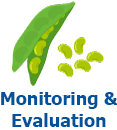 Monitoring, Evaluation, and Learning (MEL) is about creating, collecting, and analysing data and information on the progress, outcomes, and impact of a policy. It creates the evidence that then ideally informs the implementation or adaption process of the concerned policy, and/or feeds into advocacy efforts and the development of new policies.
Monitoring, Evaluation, and Learning (MEL) is about creating, collecting, and analysing data and information on the progress, outcomes, and impact of a policy. It creates the evidence that then ideally informs the implementation or adaption process of the concerned policy, and/or feeds into advocacy efforts and the development of new policies.
Different MEL Frameworks (3)
Type: Manuals and guidelines (how-to)
This manual describes some technical aspects in Monitoring and Evaluation for field extension workers. It describes some procedures in indicator setting, use of various tools and sources of information that is used for monitoring purposes.
Type: Conceptual (definitions and frameworks)
Policy influence and advocacy are increasingly regarded as a means of creating sustainable policy change in international development. It is often also seen as a difficult area to monitor and evaluate. Yet there is an increasingly rich strand of innovation in options to monitor, evaluate and learn from both the successes and failures of policy influence and advocacy interventions. This paper explores current trends in monitoring and evaluating policy influence and advocacy; discusses different theories of how policy influence happens; and presents a number of options to monitor and evaluate different aspects of advocacy interventions. Case studies describe how some organisations have used these options in practice to understand their impact and improve their advocacy strategies.
ODI Working Paper 395.
Type: Conceptual (definitions and frameworks)
The author asks the question, how evidence can best be prepared, packaged and made available to have the highest chance of impact (influencing the policy process).

